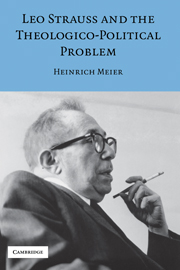Book contents
- Frontmatter
- Contents
- Preface to the American Edition
- I THE THEOLOGICO-POLITICAL PROBLEM: ON THE THEME OF LEO STRAUSS
- 1 The Theologico-Political Problem
- 2 On the Genealogy of Faith in Revelation
- 3 Death as God: A Note on Martin Heidegger
- II THE HISTORY OF PHILOSOPHY AND THE INTENTION OF THE PHILOSOPHER: REFLECTIONS ON LEO STRAUSS
- III WHAT IS POLITICAL THEOLOGY?
- IV WHY POLITICAL PHILOSOPHY?
- APPENDIX: TWO UNPUBLISHED LECTURES BY LEO STRAUSS
- Index of Names
1 - The Theologico-Political Problem
Published online by Cambridge University Press: 05 March 2013
- Frontmatter
- Contents
- Preface to the American Edition
- I THE THEOLOGICO-POLITICAL PROBLEM: ON THE THEME OF LEO STRAUSS
- 1 The Theologico-Political Problem
- 2 On the Genealogy of Faith in Revelation
- 3 Death as God: A Note on Martin Heidegger
- II THE HISTORY OF PHILOSOPHY AND THE INTENTION OF THE PHILOSOPHER: REFLECTIONS ON LEO STRAUSS
- III WHAT IS POLITICAL THEOLOGY?
- IV WHY POLITICAL PHILOSOPHY?
- APPENDIX: TWO UNPUBLISHED LECTURES BY LEO STRAUSS
- Index of Names
Summary
Nothing is as controversial in the thought of Leo Strauss and nothing is as central to a proper understanding of it as the theologico-political problem. Not only is the position that Strauss takes on the theologico-political problem controversial. The controversy already concerns what position he in truth took. And since the theologico-political problem lies at the center of Strauss's political philosophy, the controversy shapes the confrontation with all the great themes of Strauss's oeuvre, ranging from the dialogue between the ancients and the moderns via philosophy as a way of life and the exoteric-esoteric art of writing to the critique of historicism.
In 1964, Strauss himself made clear beyond all doubt the centrality of the theologico-political problem in one of his not exactly numerous autobiographical remarks. The statement, which long received next to no attention, though it succinctly names the internal unity of his works in a single sentence, is prepared for by the opening of the “Preface to the English Translation” that he wrote in August 1962 for the American edition of his first work, Die Religionskritik Spinozas. The first paragraph reads: “This study on Spinoza's Theologico-political Treatise was written during the years 1925–28 in Germany. The author was a young Jew born and raised in Germany who found himself in the grip of the theologico-political predicament.” In October 1964, shortly after his sixty-fifth birthday, Strauss once again looked back at the beginnings of his path of thought in Germany, this time in the preface to Hobbes' politische Wissenschaft, the German edition of The Political Philosophy of Hobbes.
- Type
- Chapter
- Information
- Leo Strauss and the Theologico-Political Problem , pp. 3 - 28Publisher: Cambridge University PressPrint publication year: 2006



